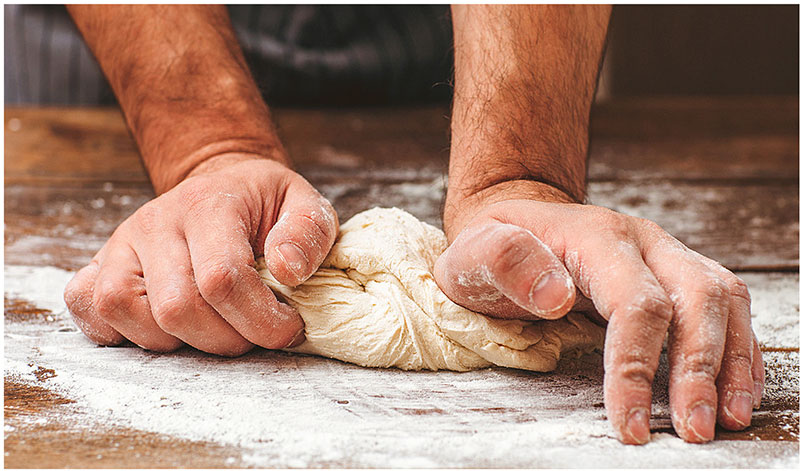



The baking industry continues to evolve with the introduction of advanced food processing equipment and turnkey solutions. As essential machinery for industrial bakeries, dough mixers play a critical role in ensuring the quality and consistency of baked goods. These machines are designed to enhance productivity and deliver uniform dough consistency throughout large-scale production processes.
In large-scale commercial baking, maintaining consistent dough quality is essential for producing uniform products every time. Industrial dough mixers are specifically engineered to handle high output while ensuring the texture and quality of baked goods remain consistent. They not only boost efficiency but also make the dough preparation process more reliable.
In this blog, we’ll explore how dough mixers are transforming the commercial baking industry, key factors to consider when selecting a dough mixer, and the advantages of integrating them into production lines.
In large-scale bakeries, the need for high-efficiency equipment that can handle significant production volumes is critical. Industrial dough mixers are designed to meet this demand by efficiently combining ingredients, ensuring uniform mixing, and improving overall product quality.
Whether you are baking bread, pizza dough, or pastries, industrial dough mixers provide the consistency and speed needed for large production runs. These machines are engineered to handle different types of dough and create uniform consistency, preventing issues such as uneven texture or inconsistent rise.
One of the most significant benefits of using industrial dough mixers is their ability to create consistent dough. Unlike manual mixing, which can lead to variations in texture and consistency, dough mixers maintain an even distribution of ingredients throughout the dough.
By accurately controlling the mixing process, these machines ensure that the dough’s hydration, flour distribution, and yeast activation are uniform. This results in baked goods that have consistent texture, flavor, and rise every time.
There are different types of dough mixers available, each suited for specific baking needs. The two most common types are planetary mixers and spiral mixers. Both have unique benefits, depending on the type of dough being prepared.
| Mixer Type | Best For | Advantages | Disadvantages |
|---|---|---|---|
| Planetary Mixer | Cake, cookies, light dough | Versatile, good for small batches | Less efficient for thick dough |
| Spiral Mixer | Bread, pizza, heavy dough | Excellent for heavy dough, high capacity | Takes up more space |
Planetary mixers are best for light doughs and small batches, while spiral mixers are preferred for dense doughs used in bread production. Depending on your production volume and type of products, choosing the right mixer can significantly enhance your bakery’s efficiency.
For commercial bakeries, using a dough mixer isn’t just a matter of convenience; it’s about consistency and efficiency. These machines allow bakeries to scale production without compromising on the quality of the final product. In high-volume settings, manual mixing becomes impractical, and an industrial dough mixer ensures that every batch is up to standard.
Moreover, dough mixers are designed to handle large batches of dough quickly, making them essential in reducing overall production time. This efficiency directly correlates with increased output and, by extension, greater profitability.
To get the most out of your dough mixer, proper maintenance is crucial. Here are a few tips to ensure your equipment operates smoothly and has a long service life:
By following these simple maintenance practices, bakeries can extend the lifespan of their equipment and reduce unexpected downtime.
Equipping your baking production line with industrial-grade dough mixers is essential for ensuring consistently high-quality baked goods. Whether you produce bread, pastries, or pizza dough, selecting the right mixer enhances efficiency, consistency, and overall product quality. If you aim to boost your bakery’s production capacity, investing in a dough mixer is a step in the right direction. At Chengwo, we offer a range of industrial-grade baking solutions designed to streamline your production process and enhance product consistency.
What types of dough can industrial dough mixers handle?
Industrial dough mixers are versatile and can handle a wide variety of doughs, from light batters used in cakes to dense, heavy doughs used for bread and pizza. The key is selecting the right mixer type for the specific dough you intend to produce.
How can I improve the efficiency of my dough mixer?
To improve the efficiency of your dough mixer, it’s important to choose a machine with the correct capacity for your production needs, maintain the equipment regularly, and ensure it is properly calibrated to mix ingredients evenly.
Can industrial dough mixers reduce labor costs?
Yes, industrial dough mixers can significantly reduce labor costs by automating the dough preparation process. This allows workers to focus on other tasks and speeds up production.

